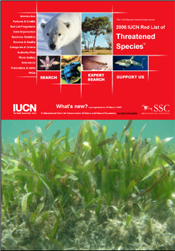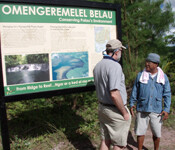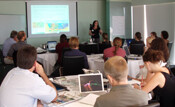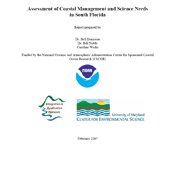Course in Communicating Science Effectively
A reminder that the Integration and Application Network is conducting a 5 day course in communicating science effectively. The course is being held at the Annapolis Synthesis Center in Annapolis, Maryland, 23-27 April, 2007. The hands-on approach means that participants come away from the course with the technical skills to effectively communicate their own data with a variety of science communication products. Further details and online registration are available on the course website.Science Communication Intern
This internship is aimed at advanced undergraduate or graduate students with backgrounds in science and communication. See the UMCES employment page for further details.IUCN Red List Assessment of Caribbean seagrass, mangrove, coral and algae
 This workshop was run by the International Union for Conservation of Nature and Natural Resources (IUCN) and funded by Conservation International. Some 40,000 species globally have been assessed by IUCN, however the vast majority are terrestrial species so there is a current focus on assessing marine species. Tim Carruthers from IAN attended this workshop in Dominica and, drawing on experience working in Panama and Mexico, took part in assessments of Caribbean seagrass species. After internal review these assessments will appear on the IUCN Red List website in 2008.
This workshop was run by the International Union for Conservation of Nature and Natural Resources (IUCN) and funded by Conservation International. Some 40,000 species globally have been assessed by IUCN, however the vast majority are terrestrial species so there is a current focus on assessing marine species. Tim Carruthers from IAN attended this workshop in Dominica and, drawing on experience working in Panama and Mexico, took part in assessments of Caribbean seagrass species. After internal review these assessments will appear on the IUCN Red List website in 2008.
Protecting the natural heritage of Palau
 The beautiful small island nation of Palau is located in the Pacific Ocean approximately 500 miles east of the Philippines. Managing the natural heritage of Palau is proving to be a balancing act between protecting the islands' natural heritage while allowing development to meet the growing number of tourists. Staff from the Integration and Application Network recently visited Palau to host a series of workshops aimed a synthesizing key features, current knowledge and management priorities into a series of conceptual diagrams. The workshops were attended by receptive and engaged staff of the Palau Conservation Society, Palauan government agencies and other members of the conservation community. Conceptual diagrams will become an integral component in the process of developing ecosystem based management plans for the islands. This IAN project was funded by the David and Lucile Packard Foundation.
The beautiful small island nation of Palau is located in the Pacific Ocean approximately 500 miles east of the Philippines. Managing the natural heritage of Palau is proving to be a balancing act between protecting the islands' natural heritage while allowing development to meet the growing number of tourists. Staff from the Integration and Application Network recently visited Palau to host a series of workshops aimed a synthesizing key features, current knowledge and management priorities into a series of conceptual diagrams. The workshops were attended by receptive and engaged staff of the Palau Conservation Society, Palauan government agencies and other members of the conservation community. Conceptual diagrams will become an integral component in the process of developing ecosystem based management plans for the islands. This IAN project was funded by the David and Lucile Packard Foundation.
Science Communication Course (IWA)
 Jane Thomas from the Integration and Application Network conducted a four-day course on science communication in Brisbane, Australia, March 5-9, hosted by the International WaterCentre. The 18 participants were staff involved in the Reef Water Quality Partnership, an initiative of the Australian federal and Queensland state governments and regional natural resource management bodies supporting the Great Barrier Reef Water Quality Protection Plan. Co-instructors were Eva Abal and Emily Saeck from Healthy Waterways and Kate Moore from the University of Queensland.
Jane Thomas from the Integration and Application Network conducted a four-day course on science communication in Brisbane, Australia, March 5-9, hosted by the International WaterCentre. The 18 participants were staff involved in the Reef Water Quality Partnership, an initiative of the Australian federal and Queensland state governments and regional natural resource management bodies supporting the Great Barrier Reef Water Quality Protection Plan. Co-instructors were Eva Abal and Emily Saeck from Healthy Waterways and Kate Moore from the University of Queensland.
Assessment of Coastal Management and Science Needs in South Florida
 Resource managers in South Florida recognize that they need to address threats to natural resources by taking action to restore and sustain ecosystems. The attention and resources formerly directed toward basic ecosystem research in South Florida are increasingly directed toward broader goals of a region-wide restoration effort. NOAA Center for Sponsored Coastal Ocean Research (CSCOR) contracted the Integration and Application Network to identify strategic needs for coastal ecosystem science that address the new emphasis on ecosystem restoration in South Florida. This report presents the findings and recommendations of the study.
Resource managers in South Florida recognize that they need to address threats to natural resources by taking action to restore and sustain ecosystems. The attention and resources formerly directed toward basic ecosystem research in South Florida are increasingly directed toward broader goals of a region-wide restoration effort. NOAA Center for Sponsored Coastal Ocean Research (CSCOR) contracted the Integration and Application Network to identify strategic needs for coastal ecosystem science that address the new emphasis on ecosystem restoration in South Florida. This report presents the findings and recommendations of the study.